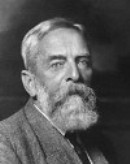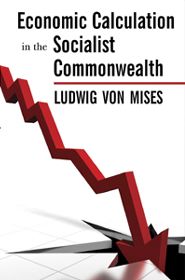The Austrian School is a heterodox school of economic thought that advocates strict adherence to methodological individualism, the concept that social phenomena result exclusively from the motivations and actions of individuals. Austrian school theorists hold that economic theory should be exclusively derived from basic principles of human action.
A planned economy is a type of economic system where the distribution of goods and services or the investment, production and the allocation of capital goods takes place according to economic plans that are either economy-wide or limited to a category of goods and services. A planned economy may use centralized, decentralized, participatory or Soviet-type forms of economic planning. The level of centralization or decentralization in decision-making and participation depends on the specific type of planning mechanism employed.
The economic calculation problem is a criticism of using economic planning as a substitute for market-based allocation of the factors of production. It was first proposed by Ludwig von Mises in his 1920 article "Economic Calculation in the Socialist Commonwealth" and later expanded upon by Friedrich Hayek.

Friedrich Freiherr von Wieser was an early economist of the Austrian School of economics. Born in Vienna, the son of Privy Councillor Leopold von Wieser, a high official in the war ministry, he first trained in sociology and law. In 1872, the year he took his degree, he encountered Austrian-school founder Carl Menger's Grundsätze and switched his interest to economic theory. Wieser held posts at the universities of Vienna and Prague until succeeding Menger in Vienna in 1903, where along with his brother-in-law Eugen von Böhm-Bawerk he shaped the next generation of Austrian economists including Ludwig von Mises, Friedrich Hayek and Joseph Schumpeter in the late 1890s and early 20th century. He was the Austrian Minister of Commerce from August 30, 1917, to November 11, 1918.

Human Action: A Treatise on Economics is a work by the Austrian economist and philosopher Ludwig von Mises. Widely considered Mises' magnum opus, it presents the case for laissez-faire capitalism based on praxeology, his method to understand the structure of human decision-making. Mises rejected positivism within economics, and defended an a priori foundation for praxeology, as well as methodological individualism and laws of self-evident certainty. Mises argues that the free-market economy not only outdistances any government-planned system, but ultimately serves as the foundation of civilization itself.

An economic system, or economic order, is a system of production, resource allocation and distribution of goods and services within a society. It includes the combination of the various institutions, agencies, entities, decision-making processes, and patterns of consumption that comprise the economic structure of a given community.

Oskar Ryszard Lange was a Polish economist and diplomat. He is best known for advocating the use of market pricing tools in socialist systems and providing a model of market socialism. He responded to the economic calculation problem proposed by Ludwig von Mises and Friedrich Hayek by claiming that managers in a centrally-planned economy would be able to monitor supply and demand through increases and declines in inventories of goods, and advocated the nationalization of major industries. During his stay in the United States, Lange was an academic teacher and researcher in mathematical economics. Later in socialist Poland, he was a member of the Central Committee of the Polish United Workers' Party.
In economics, a price system is a system through which the valuations of any forms of property are determined. All societies use price systems in the allocation and exchange of resources as a consequence of scarcity. Even in a barter system with no money, price systems are still utilized in the determination of exchange ratios between the properties being exchanged.

Criticism of socialism is any critique of socialist economics and socialist models of organization and their feasibility, as well as the political and social implications of adopting such a system. Some critiques are not necessarily directed toward socialism as a system but rather toward the socialist movement, parties, or existing states. Some critics consider socialism to be a purely theoretical concept that should be criticized on theoretical grounds, such as in the economic calculation problem and the socialist calculation debate, while others hold that certain historical examples exist and that they can be criticized on practical grounds. Because there are many types of socialism, most critiques are focused on a specific type of socialism, that of the command economy and the experience of Soviet-type economies that may not apply to all forms of socialism as different models of socialism conflict with each other over questions of property ownership, economic coordination and how socialism is to be achieved. Critics of specific models of socialism might be advocates of a different type of socialism.
The Lange model is a neoclassical economic model for a hypothetical socialist economy based on public ownership of the means of production and a trial-and-error approach to determining output targets and achieving economic equilibrium and Pareto efficiency. In this model, the state owns non-labor factors of production, and markets allocate final goods and consumer goods. The Lange model states that if all production is performed by a public body such as the state, and there is a functioning price mechanism, this economy will be Pareto-efficient, like a hypothetical market economy under perfect competition. Unlike models of capitalism, the Lange model is based on direct allocation, by directing enterprise managers to set price equal to marginal cost in order to achieve Pareto efficiency. By contrast, in a capitalist economy, private owners seek to maximize profits, while competitive pressures are relied on to indirectly lower the price, this discourages production with high marginal cost and encourages economies of scale.
Economic planning is a resource allocation mechanism based on a computational procedure for solving a constrained maximization problem with an iterative process for obtaining its solution. Planning is a mechanism for the allocation of resources between and within organizations contrasted with the market mechanism. As an allocation mechanism for socialism, economic planning replaces factor markets with a procedure for direct allocations of resources within an interconnected group of socially owned organizations which together comprise the productive apparatus of the economy.

Ludwig Heinrich Edler von Mises was an Austrian-American Austrian School economist, historian, logician, and sociologist. Mises wrote and lectured extensively on the societal contributions of classical liberalism and the power of consumers. He is best known for his work on praxeology studies comparing communism and capitalism.
Criticism of Marxism has come from various political ideologies and academic disciplines. This includes general intellectual criticism about dogmatism, a lack of internal consistency, criticism related to materialism, arguments that Marxism is a type of historical determinism or that it necessitates a suppression of individual rights, issues with the implementation of communism and economic issues such as the distortion or absence of price signals and reduced incentives. In addition, empirical and epistemological problems are frequently identified.
Calculation in kind or calculation in-natura is a way of valuating resources and a system of accounting that uses disaggregated physical magnitudes as opposed to a common unit of calculation. As the basis for a socialist economy, it was proposed to replace money and financial calculation. In an in-kind economy products are produced for their use values and accounted in physical terms. By contrast, in money-based economies, commodities are produced for their exchange value and accounted in monetary terms.
Production for use is a phrase referring to the principle of economic organization and production taken as a defining criterion for a socialist economy. It is held in contrast to production for profit. This criterion is used to distinguish communism from capitalism, and is one of the fundamental defining characteristics of communism.
Throughout modern history, a variety of perspectives on capitalism have evolved based on different schools of thought.

William Paul Cockshott is a Scottish academic in the fields of computer science and Marxist economics. He is a Reader at the University of Glasgow. Since 1993 he has authored multiple works in the tradition of scientific socialism, most notably Towards a New Socialism and How the World Works.
Social ownership a type of property where an asset is recognized to be in the possession of society as a whole rather than individual members or groups within it. Social ownership of the means of production is the defining characteristic of a socialist economy, and can take the form of community ownership, state ownership, common ownership, employee ownership, cooperative ownership, and citizen ownership of equity. Within the context of socialist economics it refers particularly to the appropriation of the surplus product, produced by the means of production, or the wealth that comes from it, to society at large or the workers themselves. Traditionally, social ownership implied that capital and factor markets would cease to exist under the assumption that market exchanges within the production process would be made redundant if capital goods were owned and integrated by a single entity or network of entities representing society. However, the articulation of models of market socialism where factor markets are utilized for allocating capital goods between socially owned enterprises broadened the definition to include autonomous entities within a market economy.
The socialist calculation debate, sometimes known as the economic calculation debate, was a discourse on the subject of how a socialist economy would perform economic calculation given the absence of the law of value, money, financial prices for capital goods and private ownership of the means of production. More specifically, the debate was centered on the application of economic planning for the allocation of the means of production as a substitute for capital markets and whether or not such an arrangement would be superior to capitalism in terms of efficiency and productivity.
Towards a New Socialism is a 1993 non-fiction book written by Scottish computer scientist Paul Cockshott, co-authored by Scottish economics professor Allin F. Cottrell. The book outlines in detail a proposal for a complex planned socialist economy, taking inspiration from cybernetics, the works of Karl Marx, and British operations research scientist Stafford Beer's 1973 model of a distributed decision support system dubbed Project Cybersyn. Aspects of a socialist society such as direct democracy, foreign trade and property relations are also explored. The book is, in the authors' words, "our attempt to answer the idea that socialism is dead and buried after the demise of the Soviet Union."







